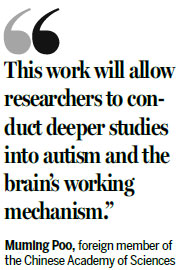Monkeys get autism gene in quest for treatments
Updated: 2016-01-26 08:08
By Wang Hongyi in Shanghai(China Daily)
|
||||||||
Research shows that nonhuman primates can be used to study human brain disorders
Chinese researchers have successfully created autistic monkeys by implanting autism-related genes into monkey embryos.
The monkeys are the world's first nonhuman primates to show the effects of autism and will play an important role in studying the pathology of the condition and exploring effective intervention and treatment.
The research has demonstrated the feasibility of studying brain disorders with genetically engineered primates, according to neuroscientist Muming Poo, a foreign member of the Chinese Academy of Sciences who is also a member of the National Academy of Sciences in the United States.
"For quite a long time, there has been little good drug innovation in autism due to the lack of suitable animal models. This work will allow researchers to conduct deeper studies into autism and the brain's working mechanism," Poo said.

Patients with autism spectrum disorder, one of a range of neurodevelopment problems, usually exhibit defects in social interaction, stereotyped repetitive behaviors, anxiety and emotional difficulties.
In recent years, the incidence of autism has continued to rise globally, and there is no effective treatment. According to a national epidemiological investigation into the prevalence of autism spectrum disorder, about four in every 1,000 Chinese children between age 6 and 12 have the condition.
"In this regard, the creation of an autism animal model to carry out related studies has been a major goal in both medicine and neuroscience," said Qiu Zilong, researcher at the Institute of Neuroscience at the Shanghai Institutes for Biological Sciences under the Chinese Academy of Sciences.
Qiu Zilong's lab, working with the team of another researcher, Sun Qiang, used transgenic methods to alter the genetic code of the monkey by implanting a synthetic human autism-related gene, MECP2.
In the future, the researchers will try to find out which defects in the neural circuits led to social interaction disorders and repetitive behaviors, as well as how the autism gene influences brain growth and function, Qiu said.
This research was to be published online in Nature on Tuesday.
wanghongyi@chinadaily.com.cn
(China Daily 01/26/2016 page4)
- A glimpse of Spring Rush: little migrant birds on the way home
- Policy puts focus on genuine artistic students
- Police unravel market where babies are bought, sold as commodities
- More older pregnant women expected
- Netizen backlash 'ugly' Spring Festival Gala mascot
- China builds Mongolian language corpus
- 2 Chinese nationals killed, 1 injured in suspected bomb attack in Laos
- New York, Washington clean up after fatal blizzard
- 'Plane wreckage' found in Thailand fuels talk of missing Malaysian jet
- Washington shuts down govt, NY rebounds after blizzard
- 7 policemen, 3 civilians killed in Egypt's Giza blast
- Former US Marine held in Iran arrives home after swap

 First trains of Spring Festival travel depart around China
First trains of Spring Festival travel depart around China
 Dough figurines of Monkey King welcome the New Year
Dough figurines of Monkey King welcome the New Year
 Ning Zetao, Liu Hong named China's athletes of the year
Ning Zetao, Liu Hong named China's athletes of the year
 Top 10 smartphone vendors based on market share in 2015
Top 10 smartphone vendors based on market share in 2015
 Snow scenery across China
Snow scenery across China
 Storm grips New York after dumping 2 feet of snow on Washington
Storm grips New York after dumping 2 feet of snow on Washington
 Art exhibitions in 2016 worth seeing
Art exhibitions in 2016 worth seeing
 Winter flexes its muscles as cold snap makes its way
Winter flexes its muscles as cold snap makes its way
Most Viewed
Editor's Picks

|

|

|

|

|

|
Today's Top News
National Art Museum showing 400 puppets in new exhibition
Finest Chinese porcelains expected to fetch over $28 million
Monkey portraits by Chinese ink painting masters
Beijing's movie fans in for new experience
Obama to deliver final State of the Union speech
Shooting rampage at US social services agency leaves 14 dead
Chinese bargain hunters are changing the retail game
Chinese president arrives in Turkey for G20 summit
US Weekly

|

|







